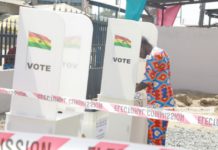
The Minority in Parliament is asserting that the Electoral Commission (EC) is acting in breach of the 1992 Constitution with its decision to abandon the use of indelible ink.
During a Parliamentary debate, MP for South Dayi, Rockson Nelson Dafeamekpor said that per the 1992 Constitution, the use of indelible ink was necessary for the smooth conduct of elections, and its removal is a breach.
“The issue of the non-use of indelible ink breaches the law. Mr Speaker, let me refer the House to Article 51 of the Constitution. The Electoral Commission shall by Constitutional Instrument make regulations for the effective performance.
“Mr Speaker, the controlling phrase there is “for the effective performance of its function under the constitution or any other law …’ So Mr Speaker you cannot come to Parliament with an Instrument where protocols have been clearly outlined and you by an administrative fiat decide that you won’t go according to protocol.
“The use of indelible ink is part of the regulations we put in the instrument for the effective performance of the Electoral Commissioner,” he said on Wednesday, December 20, 2023.
The legislator said the use of indelible ink distinguishes individuals who have voted from those yet to cast their ballot, implying that with its removal, identification might be problematic.
Mr Dafeamkpor added that during the conduct of elections, the EC Chairperson should be focused on developing measures to improve the polls rather than raising suspicions among electorates.
“She must do this that will make her perform effectively. And not to come out with instruments that would detract from the effective performance of their functions,” he added.
On December 18, the EC announced that there would be no need for indelible ink in the district-level election and subsequent polls.
Speaking at a press conference ahead of the December 19 district-level election, the EC chair, Jean Mensa, said this was part of measures by the Commission to improve the electoral process and ensure a robust identification system.
However, despite the EC’s confidence in the biometric system, at the Methodist Church polling station in the Ga-North Constituency of Greater Accra, an identical twin was refused voting because the biometric system had identified her as someone who had already voted when she insisted it was her twin sister who had voted.
ALSO READ:






